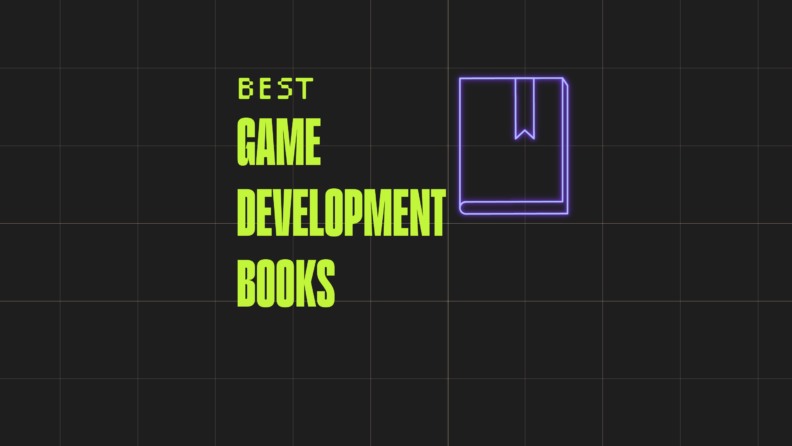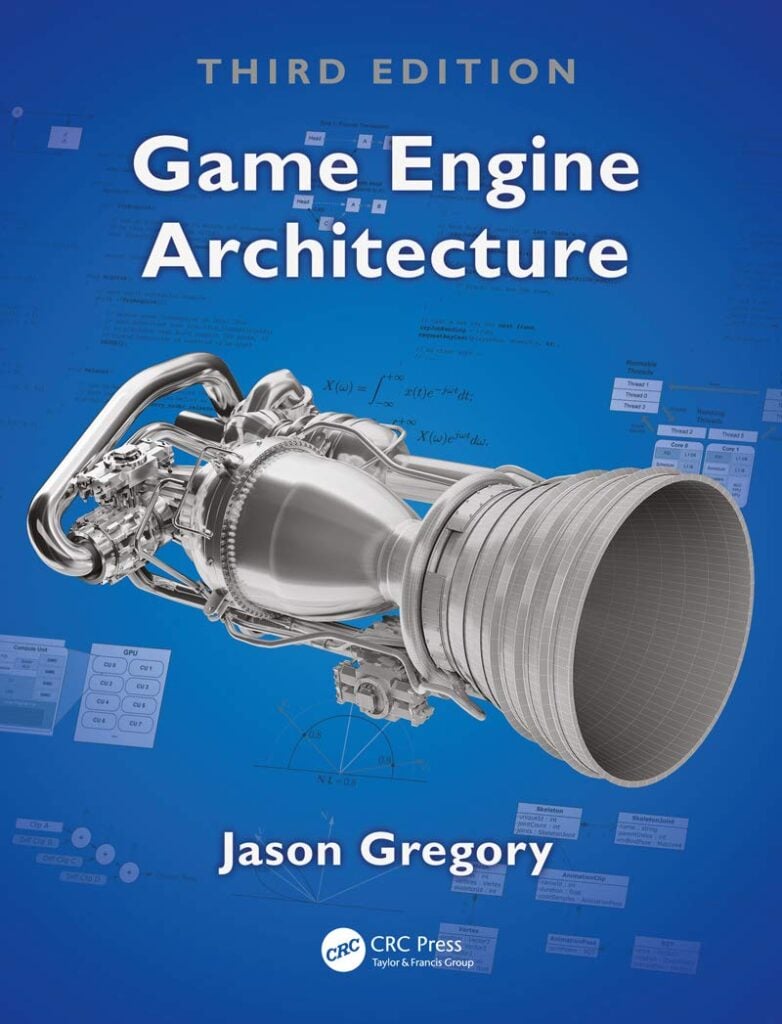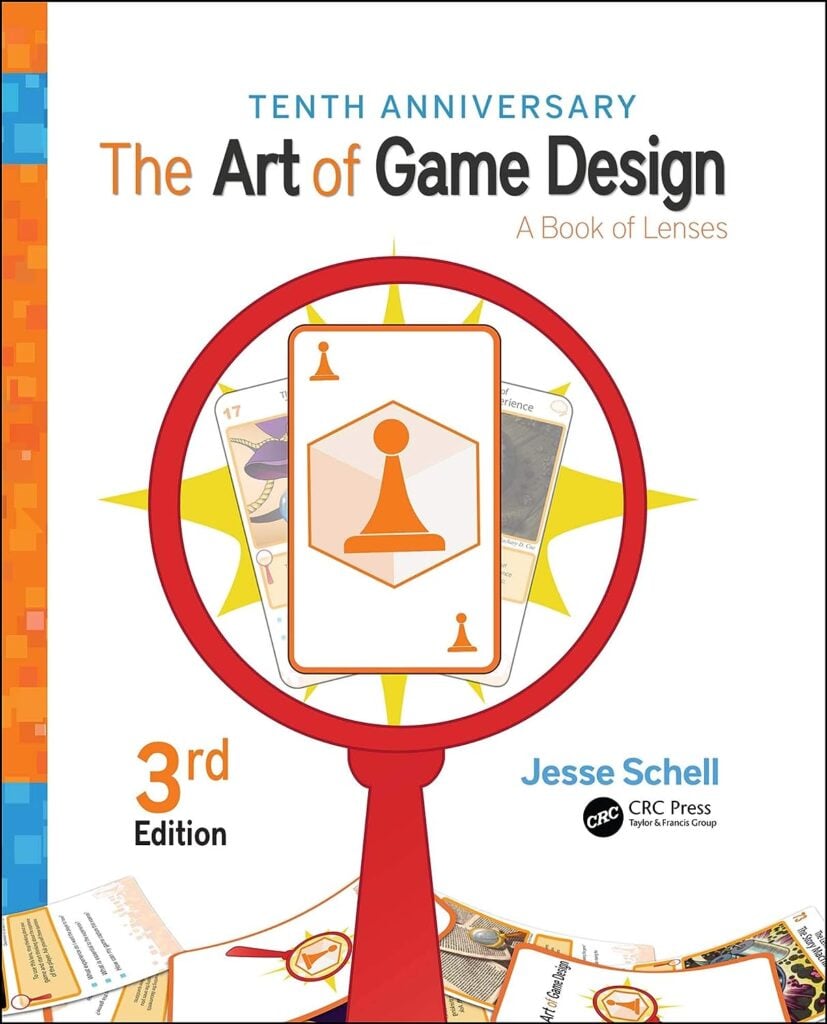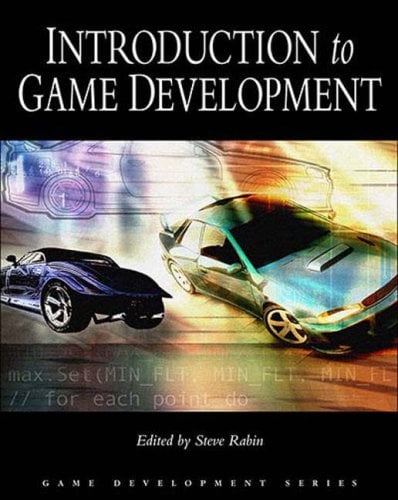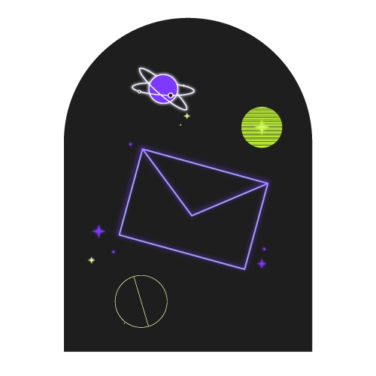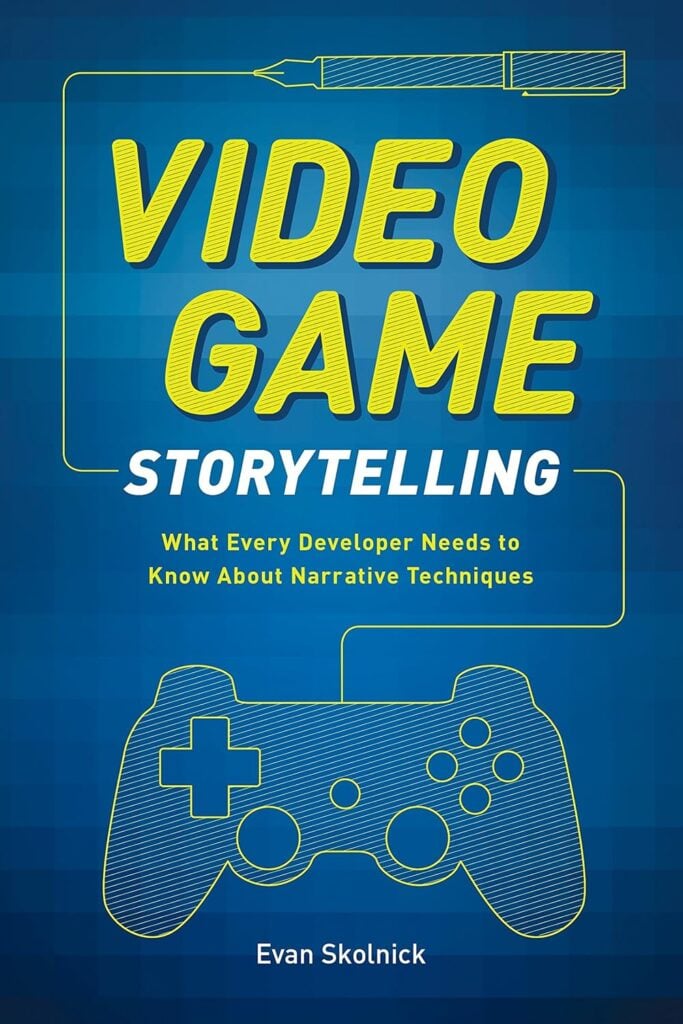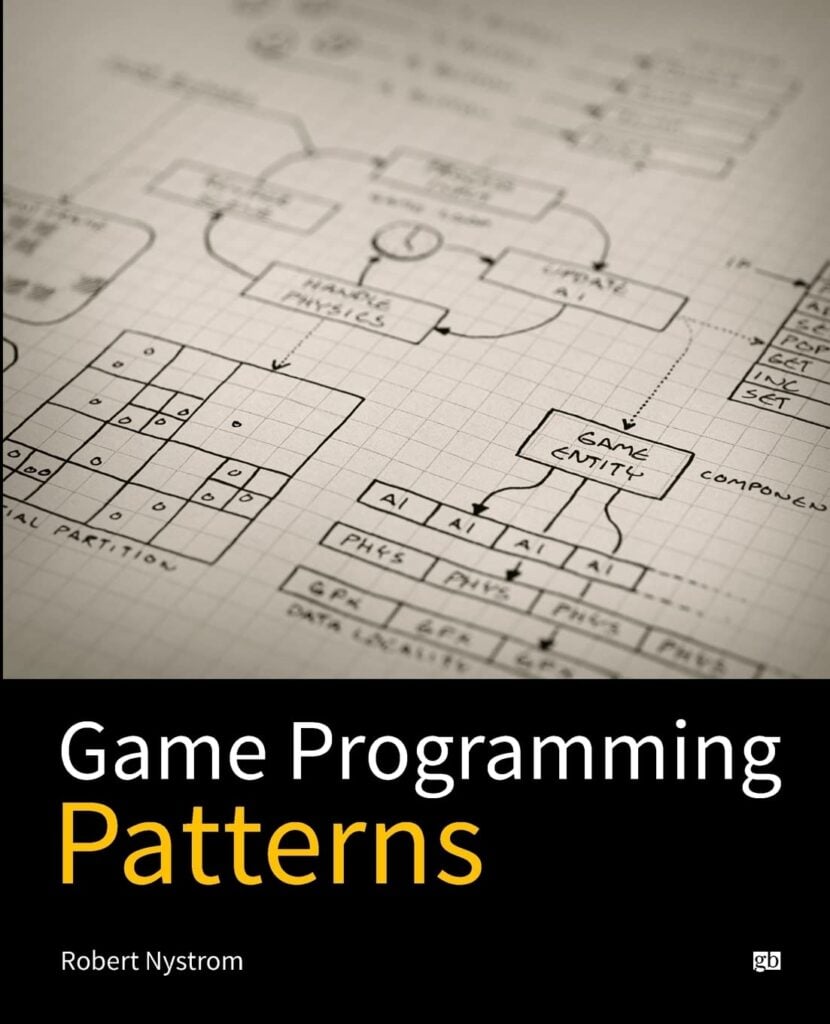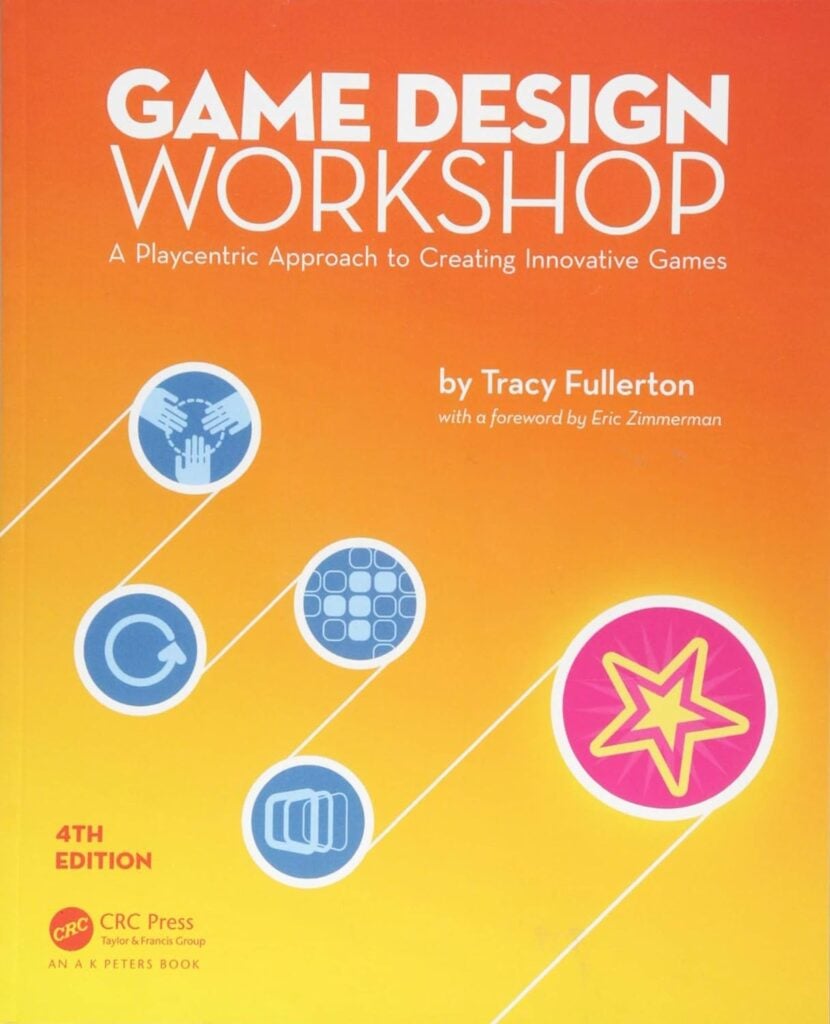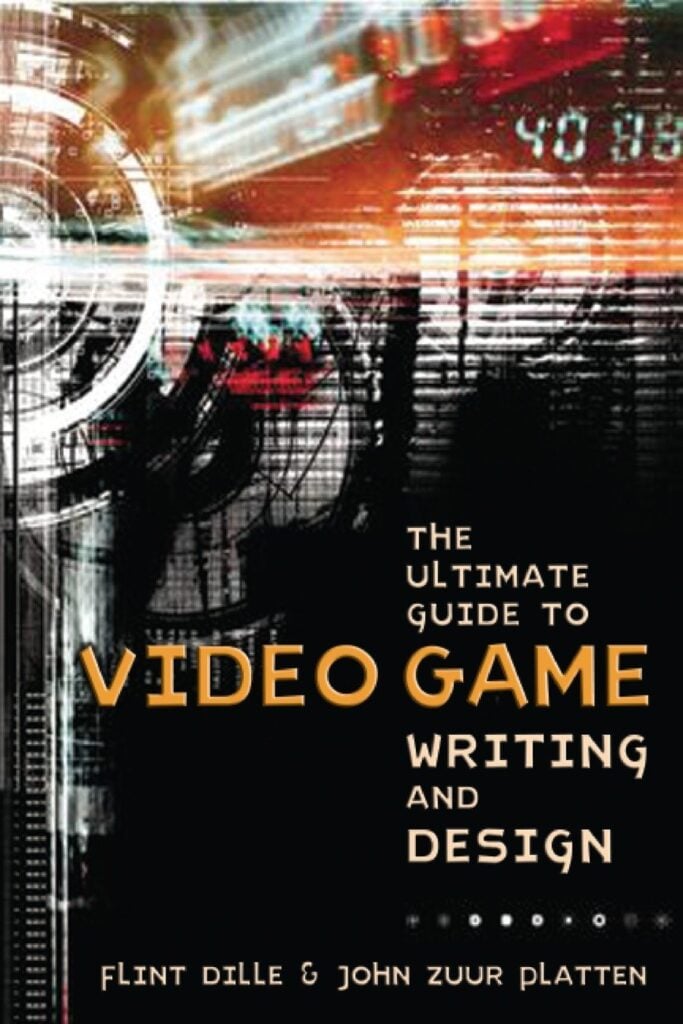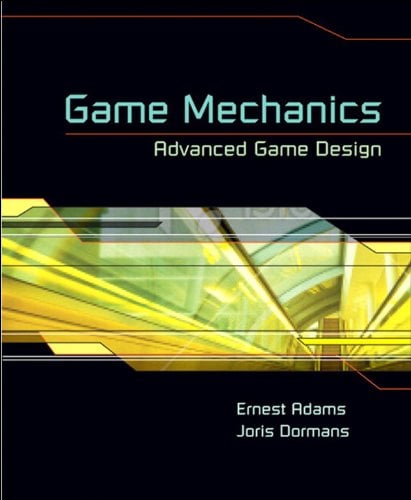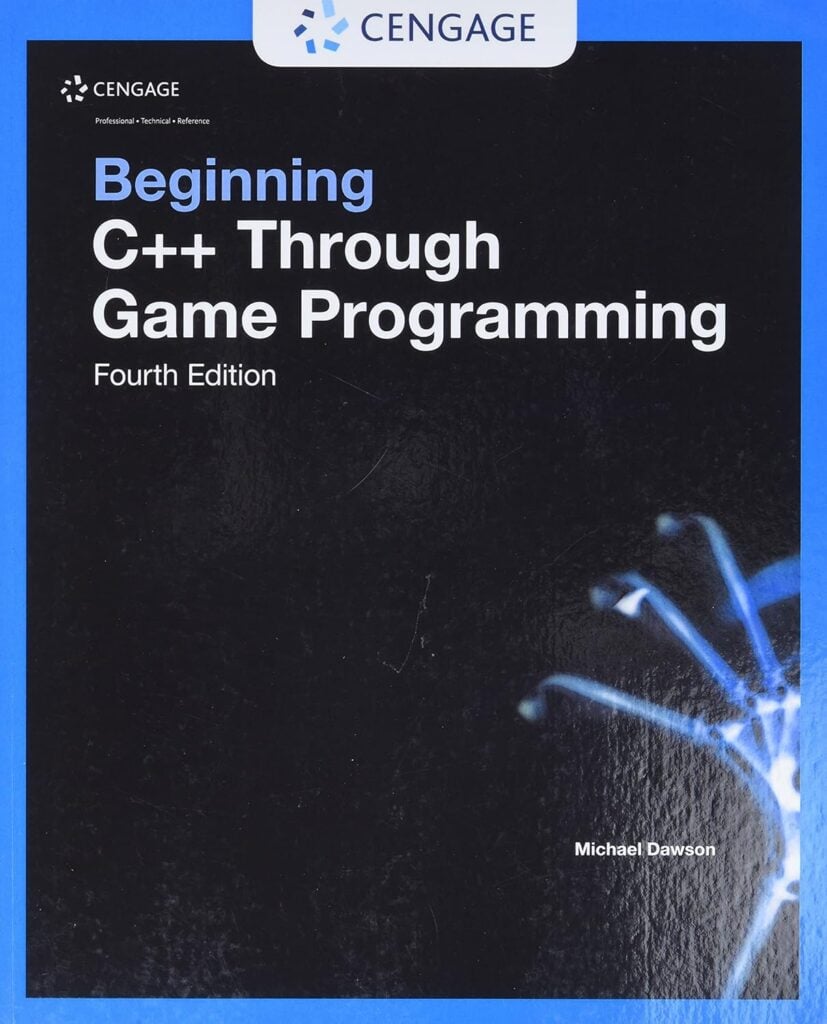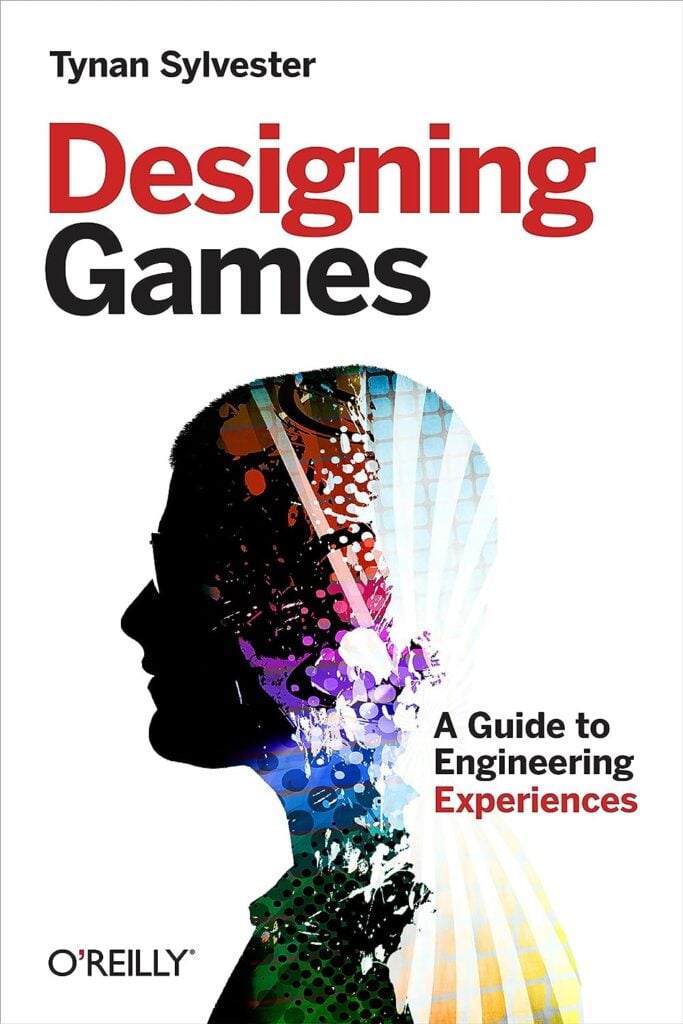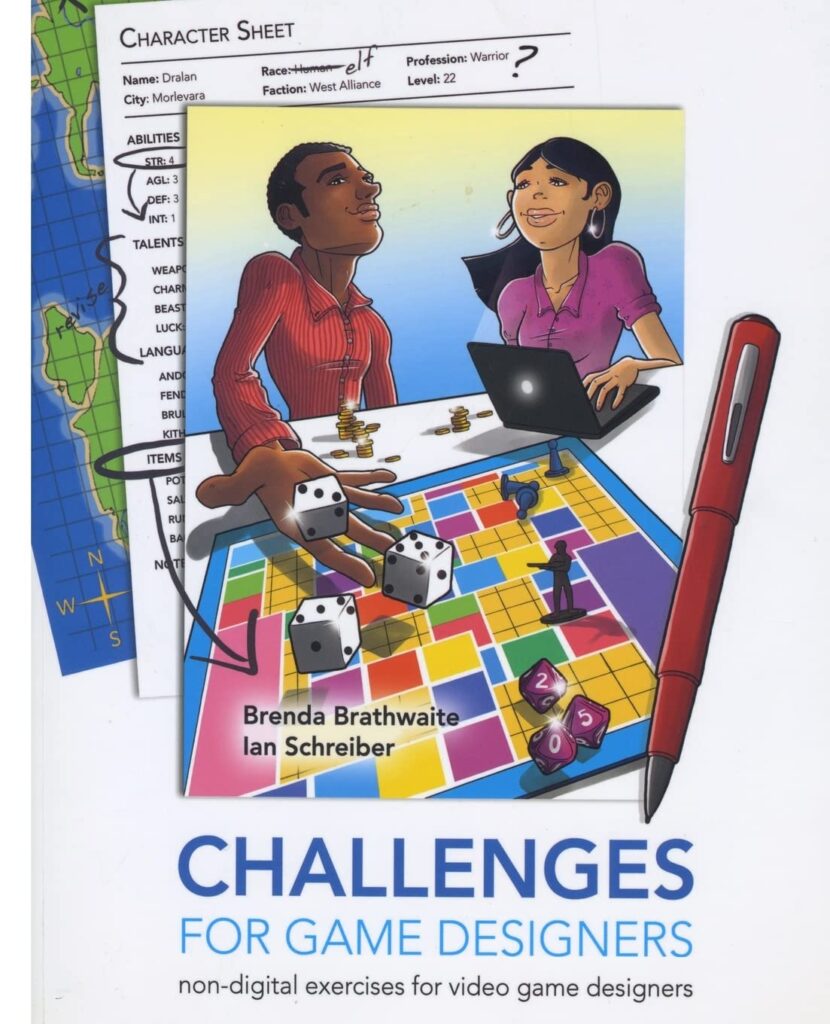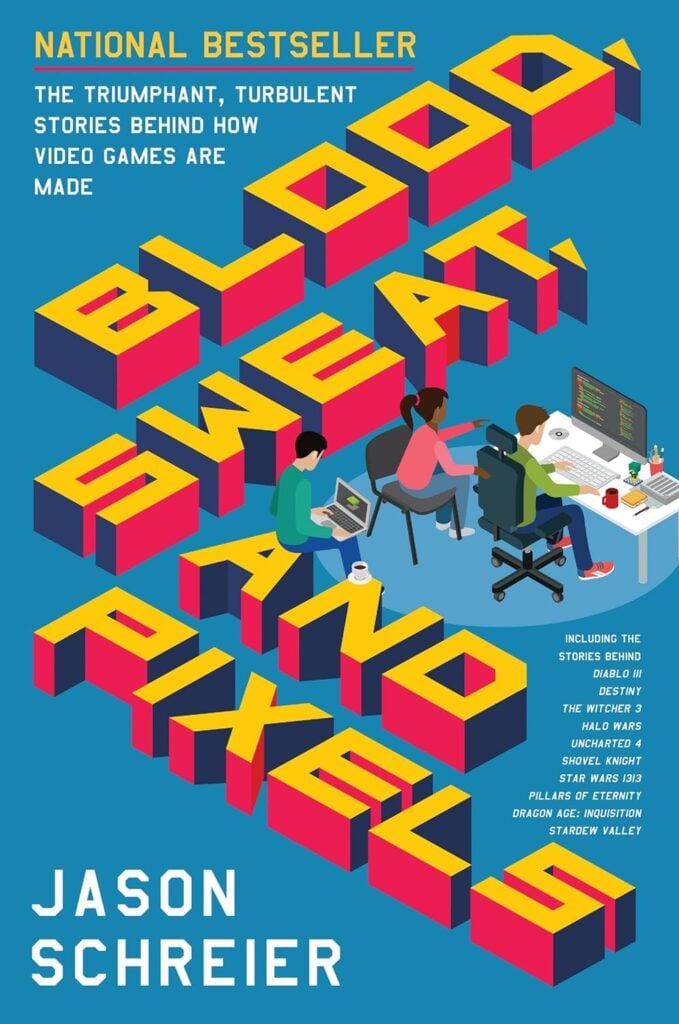Throughout my time in game development and scripting, I've come across many helpful books that have equipped me with a robust grasp of the industry's cutting-edge strategies and technologies. If you're searching for insights or tutorials in game development and design, I've got you covered. I've carefully curated resources that reflect my in-depth, practical knowledge.
18 Best Game Development Books
I've curated a list of books tailored to address the challenges in game development.
- Game Engine Architecture by Jason Gregory
- The Art of Game Design: A Book of Lenses by Jesse Schell
- Introduction to Game Development by Steve Rabin
- Level Up! The Guide to Great Video Game Design by Scott Rogers
- Video Game Storytelling by Evan Skolnick
- Game Programming Patterns by Robert Nystrom
- Game Design Workshop: A Playcentric Approach to Creating Innovative Games by Tracy Fullerton
- Rules of Play: Game Design Fundamentals by Katie Salen Tekinbaş and Eric Zimmerman
- The Ultimate Guide to Video Game Writing and Design by Flint Dille and John Zuur Platten
- Game Feel: A Game Designer's Guide to Virtual Sensation by Steve Swink
- Theory of Fun for Game Design by Raph Koster
- Game Mechanics: Advanced Game Design by Ernest Adams and Joris Dormans
- Beginning C++ Through Game Programming by Michael Dawson
- Designing Games: A Guide to Engineering Experiences by Tynan Sylvester
- Challenges for Game Designers by Brenda Brathwaite and Ian Schreiber
- Blood, Sweat, and Pixels: The Triumphant, Turbulent Stories Behind How Video Games Are Made by Jason Schreier
- Masters of Doom: How Two Guys Created an Empire and Transformed Pop Culture by David Kushner
- Unity Game Development in 24 Hours, Sams Teach Yourself by Mike Geig
Overviews Of The 19 Best Game Development Books
For every developer aspiring to make good games, here are the books to consider. Each includes a concise summary, what you’ll learn, why you should read it, and a quote I like from the book. I added the author’s LinkedIn and other places to connect with them online.
1. Game Engine Architecture by Jason Gregory
Summary:
"Game Engine Architecture" delves deep into the core systems of 3D game engines, shedding light on both their design and implementation. Jason Gregory provides a comprehensive exploration of the components, including computer graphics, that make up a typical commercial game engine, making it an invaluable resource for both students and professionals.
What You'll Learn:
- The intricacies of game engine systems, data structures, and their design principles.
- The role of each component, including game AI, in a game engine and how they interact.
- Techniques and algorithms for optimizing game engine performance.
Why You Should Read It:
This book offers an open and detailed look into the inner workings of game engines, making it a must-read for anyone looking to understand or develop in this domain. It bridges the gap between theory and practical application, ensuring readers are well-equipped to tackle real-world challenges.
Quote From The Book:
"Understanding the main components of a game engine, their purposes, and their interactions is essential for both game programmers and designers."
About The Author:
Jason Gregory is a seasoned game developer and software development expert with years of experience in the industry. He has contributed to several major titles and is known for his expertise in game engine design.
2. The Art of Game Design: A Book of Lenses by Jesse Schell
Summary:
Jesse Schell's "The Art of Game Design" is a comprehensive guide that offers a fresh perspective on game design, including board games. Through a series of lenses, Schell provides insights into the art and science of creating great games, making it a staple for game designers everywhere.
What You'll Learn:
- The principles and techniques of effective game design.
- How to evaluate and refine game ideas.
- The importance of storytelling and character development in games.
Why You Should Read It:
Schell's unique approach to crafting a better game and game design, using various lenses, provides readers with a holistic understanding of the subject. The book is thought-provoking and practical, making it an essential read for aspiring and experienced game designers alike.
Quote From The Book:
"Games are unnecessary obstacles we volunteer to tackle."
About The Author:
Jesse Schell is a renowned game designer and professor known for his innovative approaches to game design education.
3. Introduction to Game Development by Steve Rabin
Summary:
Steve Rabin's "Introduction to Game Development" is a foundational text that covers the broad spectrum of game development, including languages like Python. From design to programming, this book provides a thorough introduction to the key concepts and practices in the industry.
What You'll Learn:
- The fundamentals of game design, programming in languages like Java, and production.
- The various stages of game development and their significance.
- Techniques for creating engaging and immersive game experiences.
Why You Should Read It:
For those starting from zero to proficiency in game development or seeking a refresher, this book offers a comprehensive overview of the field. Rabin's clear explanations and practical insights make it an invaluable resource for budding game developers.
Quote From The Book:
"Game development is a blend of art and science, creativity and technology."
About The Author:
Steve Rabin is a veteran in the game development industry with a passion for teaching and mentoring the next generation of game developers.
4. Level Up! The Guide to Great Video Game Design by Scott Rogers
Summary:
"Level Up!" is a comprehensive guide that demystifies the process of video game design. Scott Rogers, with his witty and engaging style, breaks down the essentials of game creation, making it accessible to both novices and seasoned designers.
What You'll Learn:
- The foundational principles of video game design.
- Techniques to create memorable characters, engaging narratives, and enhanced game functionality.
- The art of level design, challenges, and rewards that captivate players.
Why You Should Read It:
Rogers' hands-on approach, combined with real-world examples, provides readers with actionable insights. Whether starting your game design journey or looking to refine your skills, this book is a treasure trove of knowledge.
Quote From The Book:
"Great games are made from great experiences."
About The Author:
Scott Rogers is a celebrated game designer with numerous successful titles under his belt. His passion for the craft is evident in his teachings and writings.
5. Video Game Storytelling by Evan Skolnick
Summary:
In "Video Game Storytelling," Evan Skolnick delves into the art of crafting compelling narratives for games. He emphasizes the importance of storytelling in enhancing player engagement and offers a step-by-step guide to weaving captivating tales.
What You'll Learn:
- The role of narrative in video games and its impact on player experience.
- Techniques for developing relatable characters and immersive worlds.
- The art of merging gameplay mechanics with storytelling.
Why You Should Read It:
Skolnick's expertise in narrative design shines through in this book. It's a must-read for anyone looking to elevate their game's storytelling and create memorable gaming experiences.
Quote From The Book:
"Story is not just a tool to engage the player; it's the very fabric of a memorable game."
About The Author:
Evan Skolnick is a seasoned narrative designer with a rich history in the gaming industry. His passion lies in crafting stories that resonate with players.
6. Game Programming Patterns by Robert Nystrom
Summary:
"Game Programming Patterns" offers a deep dive into the technical aspects of game development, such as shaders. Robert Nystrom presents a collection of design patterns essential for creating efficient and scalable game engines.
What You'll Learn:
- Key design patterns and object-oriented programming techniques used in game programming.
- Techniques to optimize game performance and reduce bugs.
- The art of writing clean, maintainable game code.
Why You Should Read It:
Nystrom's methodical approach to game programming makes complex concepts accessible. This book is a valuable resource for developers aiming to enhance their coding skills and build robust game engines.
Quote From The Book:
"Patterns are not about code reuse; they're about knowledge reuse."
About The Author:
Robert Nystrom is a software engineer with a deep passion for game development. His expertise in game programming has made him a respected figure in the developer community.
7. Game Design Workshop: A Playcentric Approach to Creating Innovative Games by Tracy Fullerton
Summary:
Tracy Fullerton's "Game Design Workshop" is a hands-on guide that introduces a playcentric approach to game design. It emphasizes the importance of player experience and offers a comprehensive methodology for iterative design and testing.
What You'll Learn:
- The principles of playcentric game design and its significance.
- Techniques for prototyping, playtesting, and refining game concepts.
- How to create innovative and engaging games that resonate with players.
Why You Should Read It:
Fullerton's unique play centric approach provides a fresh perspective on game design. This book is an essential read for designers aiming to create games that captivate and entertain.
Quote From The Book:
"Designing a game is a journey of discovery."
About The Author:
Tracy Fullerton is an acclaimed game designer and educator. Her passion for creating meaningful gaming experiences has influenced many in the industry.
8. Rules of Play: Game Design Fundamentals by Katie Salen Tekinbaş and Eric Zimmerman
Summary:
"Rules of Play" is a seminal work that delves into the foundational concepts of game design. Authors Katie Salen Tekinbaş and Eric Zimmerman present a thorough exploration of the rules, systems, and cultures that shape games.
What You'll Learn:
- The core principles and theories of game design.
- How rules and systems interact to create dynamic gameplay experiences.
- The cultural and social implications of games and play.
Why You Should Read It:
This book offers a deep and comprehensive look into the world of game design. It's a must-read for anyone seeking a holistic understanding of the field.
Quote From The Book:
"Games are systems, and the study of game design is an exercise in systemic thinking."
About The Authors:
Katie Salen Tekinbaş and Eric Zimmerman are renowned figures in the game design community. Their combined expertise offers readers a wealth of knowledge and insights.
9. The Ultimate Guide to Video Game Writing and Design by Flint Dille and John Zuur Platten
Summary:
This guide is a comprehensive resource for those looking to venture into the narrative aspects of game design. Flint Dille and John Zuur Platten share their expertise in crafting compelling stories and characters for video games.
What You'll Learn:
- The art of creating engaging narratives for video games.
- Techniques for character development and world-building.
- How to seamlessly integrate story with gameplay mechanics.
Why You Should Read It:
For those passionate about storytelling in games, this book offers invaluable insights. Dille and Platten's expertise ensures readers are well-equipped to craft memorable game narratives.
Quote From The Book:
"Story is the DNA of the game; it informs every aspect of design."
About The Authors:
Flint Dille and John Zuur Platten are seasoned narrative designers with a rich history in the gaming industry. Their combined experiences offer readers a unique perspective on game storytelling.
10. Game Feel: A Game Designer's Guide to Virtual Sensation by Steve Swink
Summary:
Steve Swink's "Game Feel" delves into the subtle, tactile sensations that players experience when interacting with building games and other genres. The book explores the concept of 'game feel' and how designers can craft more immersive and responsive gameplay experiences.
What You'll Learn:
- The principles behind the tactile sensation in games.
- Techniques to enhance the responsiveness and fluidity of game mechanics.
- How to create games that resonate on a sensory level with players.
Why You Should Read It:
Swink's insights into the tactile aspects of game design offer a fresh perspective. For designers aiming to create games that truly 'feel' right, this book is an invaluable resource.
Quote From The Book:
"Game feel is the secret ingredient that makes players feel connected to the game."
About The Author:
Steve Swink is a game designer with a keen interest in the sensory aspects of gameplay. His unique approach to design has influenced many in the industry.
11. Theory of Fun for Game Design by Raph Koster
Summary:
Raph Koster's "Theory of Fun for Game Design" is a thought-provoking exploration of what makes games enjoyable. The book delves into the psychology of fun and how game designers can create more engaging and memorable experiences.
What You'll Learn:
- The psychological underpinnings of fun and enjoyment.
- How to design games that captivate and entertain players.
- The role of narrative, mechanics, and aesthetics in creating fun experiences.
Why You Should Read It:
Koster's deep dive into the nature of fun provides invaluable insights for game designers. This book is a must-read for anyone seeking to understand the essence of enjoyable gameplay.
Quote From The Book:
"Fun is just another word for learning."
About The Author:
Raph Koster is a renowned game designer and theorist. His writings on the nature of fun and game design have become foundational texts in the industry.
12. Game Mechanics: Advanced Game Design by Ernest Adams and Joris Dormans
Summary:
"Game Mechanics: Advanced Game Design" is a comprehensive guide that delves into the intricacies of game mechanics. Authors Ernest Adams and Joris Dormans provide a deep exploration of how mechanics work and how they can be used to create engaging gameplay experiences.
What You'll Learn:
- The principles and techniques of advanced game mechanics.
- How to design and implement complex gameplay systems.
- Techniques for balancing and refining game mechanics.
Why You Should Read It:
For designers looking to delve deep into the technical aspects of game design, this book offers a wealth of knowledge. Adams and Dormans provide a comprehensive look at game mechanics, making it an essential read.
Quote From The Book:
"Mechanics are the heart and soul of games; they define the experience."
About The Authors:
Ernest Adams and Joris Dormans are seasoned game designers with a deep understanding of game mechanics. Their combined expertise offers readers a comprehensive look into the world of advanced game design.
13. Beginning C++ Through Game Programming by Michael Dawson
Summary:
This book offers a beginner-friendly introduction to the C++ programming language through the engaging lens of indie game development. Michael Dawson breaks down complex programming concepts into digestible lessons, ensuring that even those with no prior coding experience can grasp the fundamentals.
What You'll Learn:
- Basics of C++ and JavaScript programming tailored for game development.
- Practical coding exercises to reinforce learning.
- Game development techniques and best practices.
Why You Should Read It:
If you're new to programming, especially learning C, and are passionate about games, this book provides the perfect starting point. It combines foundational programming knowledge with practical game development insights.
Quote From The Book:
"Programming isn't about typing, it's about thinking."
About The Author:
Michael Dawson is an experienced game developer and educator. He's dedicated to making programming accessible and enjoyable for newcomers.
14. Designing Games: A Guide to Engineering Experiences by Tynan Sylvester
Summary:
Tynan Sylvester dives deep into the art and science of game design. This book provides a comprehensive overview of crafting compelling game experiences, from mechanics to narrative.
What You'll Learn:
- The psychology behind player engagement.
- Techniques for crafting memorable game narratives.
- Strategies for balancing game mechanics.
Why You Should Read It:
For anyone looking to create games that resonate with players, this book offers invaluable insights into the design process and the elements that make a game truly captivating.
Quote From The Book:
"Design is not just what it looks like and feels like. Design is how it works."
About The Author:
Tynan Sylvester is a game designer with years of industry experience. He's passionate about creating meaningful player experiences.
15. Challenges for Game Designers by Brenda Brathwaite and Ian Schreiber
Summary:
This book presents a series of challenges for aspiring game designers. Brathwaite and Schreiber provide hands-on exercises to hone design skills and stimulate creative thinking.
What You'll Learn:
- Practical exercises in game design.
- Techniques for brainstorming and iterating on game ideas.
- Insights into the challenges faced by professional game designers.
Why You Should Read It:
If you're an aspiring game designer seeking to test and expand your skills, this book offers a unique hands-on approach to learning.
Quote From The Book:
"Design is a journey of discovery."
About The Author:
Brenda Brathwaite and Ian Schreiber are seasoned game designers passionate about education. They believe in hands-on learning and the power of play.
16. Blood, Sweat, and Pixels: The Triumphant, Turbulent Stories Behind How Video Games Are Made by Jason Schreier
Summary:
Jason Schreier offers a captivating behind-the-scenes look into the world of video game development. Through ten compelling stories, he unveils the passion, perseverance, and challenges that developers face in bringing their visions to life.
What You'll Learn:
- The intricate process of game development from concept to launch.
- Real-life challenges and triumphs of renowned game developers.
- The dedication and drive required to create iconic video games.
Why You Should Read It:
For a raw and unfiltered look into the world of game development, this book provides firsthand accounts of the highs and lows developers face. It's a testament to the dedication required to navigate the turbulent waters of the gaming industry.
Quote From The Book:
"Making a video game is a long journey, fraught with peril and filled with magic."
About The Author:
Jason Schreier is a renowned journalist and author known for his deep dives into the video game industry. His insights provide a unique perspective on the world of game development.
MORE ARTICLES
- 23 Top-Notch Enterprise Game Development Software In 2023
- Unveiling the Titans: 24 Best Game Engine Software to Power Your Vision
17. Masters of Doom: How Two Guys Created an Empire and Transformed Pop Culture by David Kushner
Summary:
David Kushner chronicles the rise of John Carmack and John Romero, the visionary creators behind iconic computer games like "Doom." This book delves into their groundbreaking innovations, tumultuous partnership, and the birth of a gaming revolution.
What You'll Learn:
- The origin story of the legendary game "Doom."
- The dynamics of Carmack and Romero's partnership.
- The impact of "Doom" on pop culture and the gaming industry.
Why You Should Read It:
For anyone interested in the history of video games and the pioneers who shaped the industry, this book offers a riveting account of ambition, innovation, and the birth of a gaming legend.
Quote From The Book:
"In the world of video games, there are the masters, the players, and then there are the creators."
About The Author:
David Kushner is an acclaimed author and journalist known for his in-depth profiles on tech and gaming industry luminaries. His storytelling brings to life the legends of the digital age.
18. Unity Game Development in 24 Hours, Sams Teach Yourself by Mike Geig
Summary:
Mike Geig's guide to Unity game development is a comprehensive resource tailored for beginners. It offers a step-by-step approach to mastering the Unity game engine, ensuring readers can create their own games in a short span of time.
What You'll Learn:
- The basics of Unity game development and its interface.
- Techniques for creating 3D games, animations, and interactive scenes.
- How to integrate shaders, artificial intelligence, and real-time mechanics in your game.
Why You Should Read It:
For those new to Unity or seeking a quick refresher, this book provides a clear and concise introduction. Geig's hands-on approach ensures that readers gain practical experience while learning the theoretical aspects of Unity game development.
Quote From The Book:
"Unity is not just a tool; it's a gateway to your game development journey."
About The Author:
Mike Geig is a gamedev educator and enthusiast with a passion for Unity. His teachings have inspired many budding game developers to create their first games and dive deep into the world of game development software.
What Are Your Favorite Game Development Books?
In the vast realm of game development, I've tried to curate a list of standout titles for developers and gamers. As we anticipate new game releases and techniques, there will always be more to learn. Subscribe to our newsletter to stay put to date on the latest!

